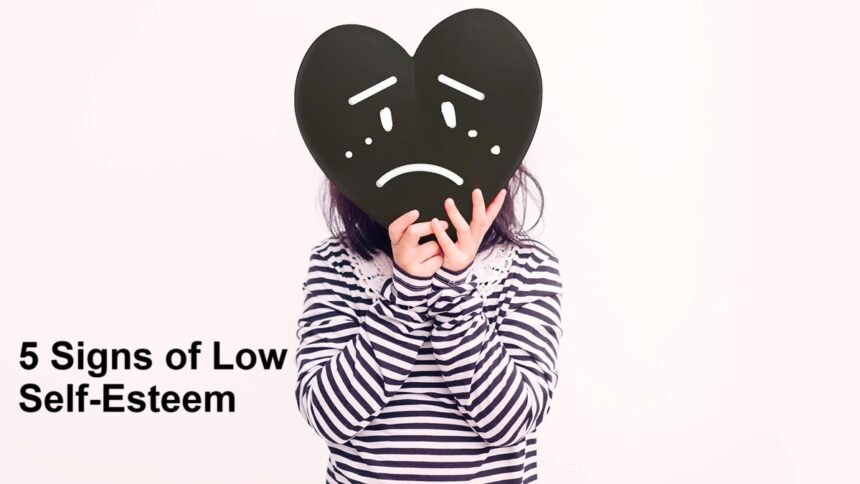Self-esteem is the way we perceive and value ourselves. It influences our confidence, decision-making, relationships, and overall mental health. While everyone experiences moments of doubt, consistently having low self-esteem can hinder personal growth and happiness. Recognizing the signs is the first step toward addressing and improving your self-perception. Here are five common signs of low self-esteem to watch out for.
1. Constant Self-Criticism
One of the most prevalent signs of low self-esteem is persistent self-criticism. Individuals with low self-worth often have an inner voice that is overly harsh, focusing on their flaws, mistakes, or shortcomings. They may frequently think thoughts like, “I’m not good enough,” or “I’ll never succeed.”
This negative self-talk diminishes confidence and fuels feelings of inadequacy. It can become a vicious cycle—believing you’re unworthy leads to fewer opportunities, which then reinforces feelings of failure and low self-esteem.
What to Watch For: Do you often find yourself berating your abilities or dwelling on your faults? Do you have difficulty accepting compliments or acknowledging your strengths? These are red flags for low self-esteem stemming from self-critical thoughts.
2. Fear of Judgement and Rejection
People with low self-esteem tend to be highly sensitive to what others think. They often worry excessively about being judged, rejected, or criticized. This fear can lead them to avoid social situations, shy away from expressing their opinions, or hesitate to try new things.
The fear of rejection can be paralyzing, causing individuals to stay within their comfort zones or disengage from activities that could help them grow. They may also interpret neutral or positive interactions negatively, assuming others are judging them critically.
What to Watch For: Do you avoid social gatherings out of fear of negative evaluation? Do you struggle with asserting yourself because you’re afraid of disappointing others? These behaviors indicate low self-esteem impacting your social confidence.
3. Difficulty Accepting Compliments
Another sign of low self-esteem is feeling uncomfortable or suspicious when receiving compliments. Instead of feeling happy or proud, individuals may dismiss praise or attribute their achievements to luck or others’ kindness.
This negative bias about themselves prevents acknowledgment of their true worth and can lead to missed opportunities or undervaluing their contributions in personal and professional settings.
What to Watch For: When someone compliments you, do you brush it off, feel undeserving, or dismiss the praise altogether? This discomfort is often rooted in a poor self-image.
4. Perfectionism and Fear of Failure
Individuals with low self-esteem often set unrealistically high standards for themselves, striving for perfection as a way to prove their worth. They believe that anything less than perfect makes them inadequate.
The fear of making mistakes or failing can be so intense that it prevents them from trying altogether. When failure does occur, they might see it as a confirmation of their inadequacy rather than a learning opportunity.
What to Watch For: Do you avoid taking risks or trying new things because you’re worried about not succeeding? Do you obsess over minor errors? These are signs that low self-esteem is fueling perfectionism and fear of failure.
5. People-Pleasing and Difficult Saying No
Low self-esteem often causes individuals to prioritize others’ needs over their own in an effort to gain approval or avoid conflict. They might go out of their way to help others, even at their own expense, and find it hard to say no to things they don’t genuinely want to do.
This pattern stems from a belief that their worth depends on pleasing others or avoiding disapproval. Over time, it can lead to burnout, resentment, and feelings of being undervalued.
What to Watch For: Do you often overcommit yourself or struggle to set boundaries? Do you fear disappointing others? These behaviors reflect low self-esteem and a lack of self-worth.
Final Thoughts
Recognizing signs of low self-esteem is crucial because it enables you to take steps toward building a healthier self-perception. Whether through self-reflection, seeking support from loved ones, or speaking with a mental health professional, addressing low self-esteem can foster greater confidence, resilience, and overall happiness.
Remember, everyone has intrinsic worth, and improving your self-esteem is a journey that involves patience, kindness, and consistent effort. Starting with awareness is the first step toward embracing your true value and living a more fulfilled life.












